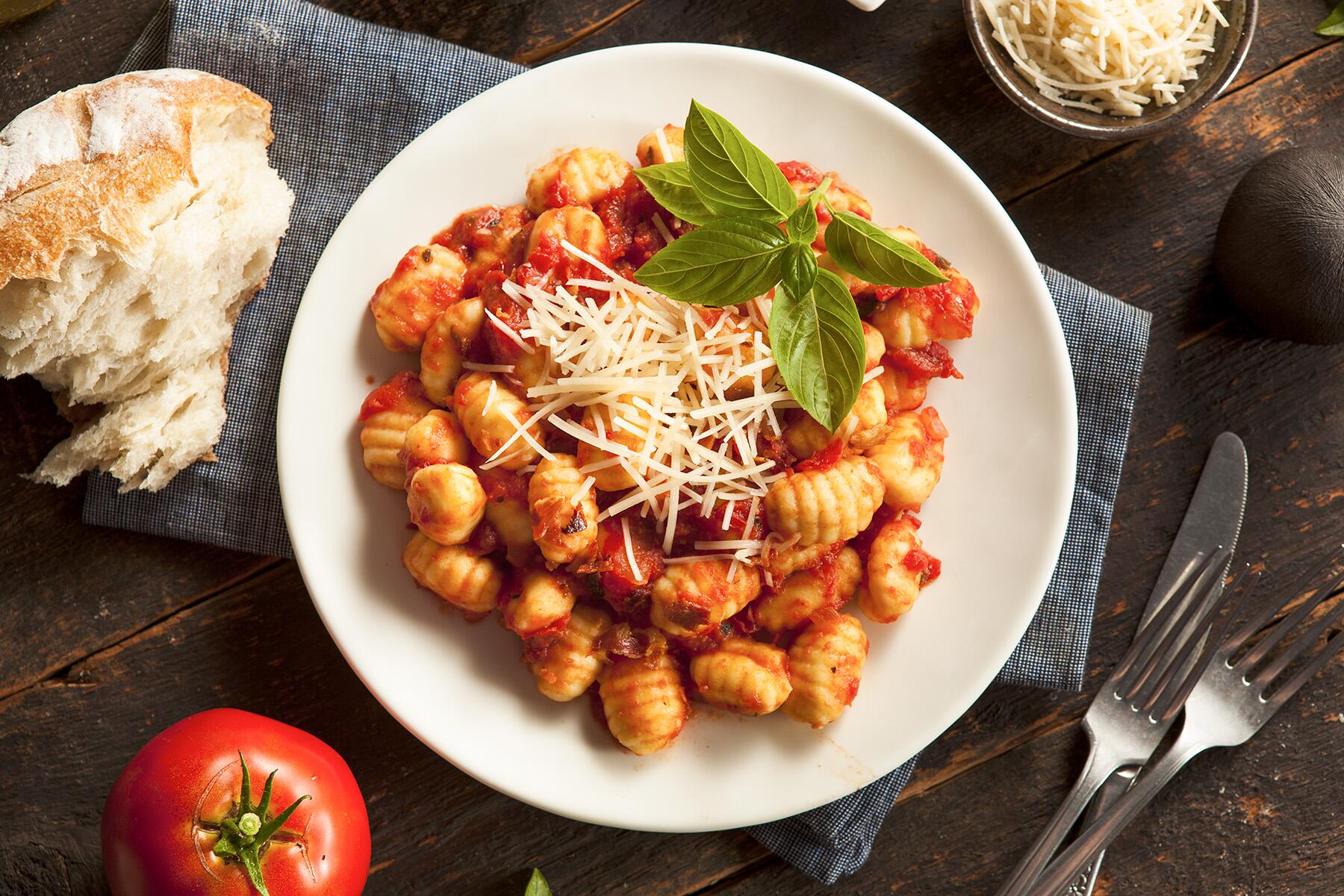We list the best foods and drinks to eat and avoid while in flight.
Eat this, not that: when it comes to a healthy lifestyle, there are a lot of rules to live by.
Unfortunately, when it comes to flying and traveling, these rules are not any easier–did you know that there are certain foods you should not eat when flying to avoid bloating and other digestive issues on the plane? And are you aware that eating some foods can actually reduce the horrid “airplane bloat” many of us feel each time we jump on a plane?
While many airlines are taking their dining experiences to new heights, airlines seem disinterested in helping passengers eat healthier while flying (we reached out to multiple airlines, and not one consults with nutritionists when creating menus on board their flights), which leaves many people packing their own snacks when flying.
Dr. Kyle Staller, M.D., a gastroenterologist from Massachusetts General Hospital, says that disrupting regular habits, particularly when it comes to what we put in our mouth, is the main culprit contributing to discomfort on planes. “Often, travel has us eating foods that we may not be accustomed to eating, which can result in excess gas production as the bacteria in our digestive system ‘eat’ and ferment these new foods.”
Recommended Fodor’s Video
Staller says, “Much like the rest of our body, the digestive tract has a circadian rhythm. When you suddenly lose those normal day/night cues that your body is used to, the bowels too can become dysfunctional while they adjust to a new time zone. Couple that with the dehydrating effects of air travel, different mealtimes, and new foods, and you have a recipe for a few days of irregularity.”
Kim Herben, Wellness Director at Desa Potato Head Bali, adds, “Because of the pressure in the plane, as we ascend, gas expands and the air is squeezed into a small space, giving us that pressure sensation in the stomach. This can lead to bloating, gas, and an uncomfortable feeling.”
Fasting has long been the approach for many to avoid “jet bloat,” but it is often unrealistic to avoid eating for 24 hours.
Dr. Harry Konig, of Brenner’s Medical Care in Baden-Baden, Germany, says that a simple solution is to control what you put in your mouth and to take note of what your body can tolerate. “Most of the time we eat too much and do the wrong thing when we travel. The daily eating habits are not respected and we consume foods offered to us without considering our tolerance and our normal habits.” He continues, “[When flying], we eat unfamiliar food and at unfamiliar times, and in addition to not moving for hours, this restricts our digestion, so it is best to listen to your body and avoid foods you don’t tolerate well anyway.”
Herben agrees, “The best idea would be fasting, but if you are not into it, [have] a light pre-flight meal a couple of hours before the flight to make sure digestion is finished, and also go for a walk every now and then while in the plane. What I always do on the morning of a long flight is drink a big glass of warm water with freshly squeezed lemon juice, preparing for the hours to come.”
Fiber: Friend or Foe?
According to Harvard Health Medical School, there are three forms of digestive issues suffered when traveling long distances: bloating, constipation, and diarrhea. The trusted institution advises increasing fiber and fluids to help you stay regular–foods like apples (with the skin), raspberries, and even bran-based cereals can help you beat many funny sensations.
Jill Mongene, a.k.a. The Aviation Dietitian, says, “Flying can be hard on the stomach if someone is not taking in proper levels of fiber. When ample fiber is not consumed, the body does not push out waste frequently [produce a bowel movement] which can lead to constipation, irritable bowel syndrome, and diarrhea.”
Mongene suggests loading up on fiber before your flight to keep the “gut motility active” and recommends eating more vegetables, which are packed full of fiber and antioxidants to help remove any unwanted radiation from being 35,000 feet in the air. “Fiber helps to keep digestion moving along and creates solid bowel movements and antioxidants [or vitamins] found in vegetables help to clear out all the radiation the body absorbs in flight,” she says.
And what about fiber-packed fruit? Herben does believe some fruits are better than others. “The fructose and sorbitol in some fruits can be gas-forming, so I try to avoid some of them, like apricots, nectarines, and plums. Papaya is always a great idea because it is one of the best natural sources of digestive enzymes. And also some veggies like cauliflower, garlic, and cabbage are better to avoid too,” she says.
Stay Hydrated: Drink Plenty of the “Free Stuff”
Hydration is key when on a long-haul flight. “When the body does not have enough fluid to keep skin, lungs, and organs hydrated, the body will conserve or retain fluid, causing bloating or fluid retention and swelling,” says Mongene. The dietitian of 17 years suggests avoiding any carbonated drinks to avoid further discomfort too. “On occasion, carbonated beverages can cause temporary bloating if the individual is not used to consuming such beverages. It is best not to try new beverages in flight if you’re concerned about bloating.”
Dr. Deanna Minich, MS, Ph.D., CNS, Certified Functional Medicine Practitioner (IFMCP), agrees. “If someone is struggling with bloating, then plain, filtered water is probably the best drink option. I prefer that people bring with them refillable containers and then fill them up at the water dispensers that are available at most airports. Bringing [green] tea bags is another option for the flight, where you can usually get hot water. As for food, mixed nuts, bananas, avocados, and apples are some of my personal favorites.”
Minich also advises that “certain herbs, such as ginger, spearmint, and fennel, can help relieve gas and are commonly found in teas. Enjoying these after a flight can support your digestive system and help reduce gas. Practicing yoga poses that involve twisting [like seated twist] can also help encourage gas to move through the intestines.”
And what about alcohol? Minich recommends limiting alcohol consumption if you can. “Since alcohol and flying can both contribute to dehydration, it may be best to forgo drinking alcohol. Additionally, drinking alcohol can displace water consumption, further adding to dehydration, as well as disrupting sleep. Overall, based on the scientific literature and what I know about its effects on the liver, I think it’s a healthy practice to avoid or reduce alcohol, which is already stressed due to everyday toxin load,” says Minich.
Dr. Konig says there is a caveat to enjoying alcohol on long-haul flights. “It is quite clear: less is more! But a small amount of alcohol enjoyed at the beginning of a long flight is relaxing and can also promote sleep. Large amounts of alcohol are definitely to be rejected as they are neither digestive nor beneficial for the change of time zones and increase the risk of thrombosis due to incorrect storage.”
Carbohydrates, Protein, or Vegetables? What’s Your Poison?
Salty and fatty foods are known to be bad choices when traveling, but what about the things doctors normally recommend in our daily lives like carbohydrates, protein, and even vegetables? The rules of eating “well” are slightly thrown out of the (airplane) window when it comes to flying. “It goes without saying that it is better to avoid foods that are difficult to digest such as raw vegetables, heavy foods in general, and even fermented drinks or dairy which are not often tolerated [well] and can cause flatulence,” says Dr. Konig.
In agreement, Minich says to steer away from carbohydrates and eating too many veggies too, “A balanced array of quality protein, healthy fats, and fiber will help keep energy stable during travel days. However, certain vegetables, such as those in the cruciferous family, may contribute to gas and bloating during flight for those who are sensitive,” she says.So what should you choose when the flight attendant comes to your seat and asks: fish or chicken? Mongene suggests sticking to protein. “It is best to eat more protein for flying than carbohydrates (because) protein staves off fatigue. If you’re flying early in the morning or to a long haul (transcontinental destination) and want to be full of energy post-flight, strive to take in at least 20 grams of protein at each meal,” she says, “Simple carbohydrates have little fiber content and tend to spike blood sugar leading to higher blood pressure. Things like candy can often make air travelers feel jittery or sleepy too. And too many carbohydrates can have a diarrhea effect. Nervous fliers tend to have more gut motility and with simple carbohydrate ingestion can cause blood sugar spikes which lead to increased and often loose bowel movements…not a good thing on any flight!”
Snacks, Supplements, and Gum?
If you need something fun on your flight to munch on, there are flight-friendly snacks too. Dr. Konig recommends having a mix of natural nuts on hand that “are easy to digest, healthy, and do not cause indigestion.”
Minich confirms that you can still enjoy snacking on long-haul flights with healthier options. “My personal favorites are Keto Cups and Lara Bars for energy on the go. However, when I arrive at my destination, I always allow time to go to the store to pick up the essentials like blueberries, salmon, micro greens, oysters [in a tin], goat cheese, and perhaps another avocado. I design all my meals around protein, and having a quality protein source when I travel is important for me to have energy and stay balanced,” says the nutritionist.
From a supplements point of view, all experts agree that taking vitamin C and melatonin helps reduce jet lag, but despite yogurt and other dairy having bloating effects, you can take probiotics and other supplements. “Personally, I have a designated bag of my favorite supplements that I bring with me on a trip, and they include vitamin C, probiotics, fish oil, a quality multivitamin like PhytoMulti, magnesium, and zinc, to name a few. I also bring electrolyte hydration packets or powders [like Moon Juice’s Magnesi-Om] to add to my water. You never know what you might need and whether you could get sick, so I tend to bring more than I might need,” says Minich.
And for those who chew gum, consider getting rid of that habit when flying.
“Some people use chewing gum to avoid eating, but this is a real mistake in a plane, as normally we are swallowing air and adding to the problem, more than solving it,” says Herben. The nutritionist suggests opting for “healthy fats” such as unsalted nuts, dried fruit, almond or peanut butter, and whole-grain crackers–all good to eat before the flight and easy to pack for the plane.
Wish the articles that lure you in to read them would tell what it they say in the headline. What is the one thing to never eat on an airplane. I read the article and came up with much more than one thing.
Is the answer gum?
Please do not bring a tea bag and use the hot water on the plane, it is rarely cleaned where it is stored and since it is hot it's growing lots of stuff to get you sick. I have a poor immune system (endometriosis + diverticulosis) and plenty of allergies and took my own medicinal tea, (ate no food on the plane since I'm allergic to all of it) by the end of the trip despite being so careful with everything I ate or drank or did; I had a sinus infection (in time for the flight home) despite not having had a cold or flu or sinus infection for over a decade. I wish I had known not to do this, I thought I was doing the smart thing, I was so miserable and uncomfortable. Save yourself the misery.
The headline does not match the article. What is the "THIS" that one should "NEVER" eat on an airplane?Hopefully, the author of the article did not write the headline.







In your article:"Overall, based on the scientific literature and what I know about its effects on the liver, I think it’s a healthy practice to avoid or reduce alcohol, which is already stressed due to everyday toxin load,” says Minich.Grammitically incorrect
Well, to be truthful, the alcohol is stressed. Perhaps it needs to increase its everyday toxin load?
Grammatically incorrect